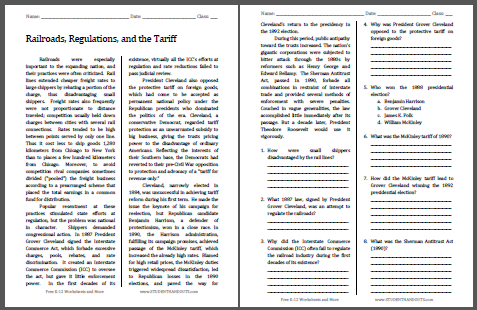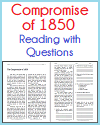| Railroads, Regulations, and the Tariff Reading with Questions |
|---|
| www.studenthandouts.com ↣ American History ↣ American History Readings with Questions |
Railroads were especially important to the expanding nation, and their practices were often criticized. Rail lines extended cheaper freight rates to large shippers by rebating a portion of the charge, thus disadvantaging small shippers. Freight rates also frequently were not proportionate to distance traveled; competition usually held down charges between cities with several rail connections. Rates tended to be high between points served by only one line. Thus it cost less to ship goods 1,280 kilometers from Chicago to New York than to places a few hundred kilometers from Chicago. Moreover, to avoid competition rival companies sometimes divided ("pooled") the freight business according to a prearranged scheme that placed the total earnings in a common fund for distribution. Popular resentment at these practices stimulated state efforts at regulation, but the problem was national in character. Shippers demanded congressional action. In 1887 President Grover Cleveland signed the Interstate commerce Act, which forbade excessive charges, pools, rebates, and rate discrimination. It created an Interstate commerce commission (ICC) to oversee the act, but gave it little enforcement power. In the first decades of its existence, virtually all the ICC's efforts at regulation and rate reductions failed to pass judicial review. Popular resentment at these practices stimulated state efforts at regulation, but the problem was national in character. Shippers demanded congressional action. In 1887 President Grover Cleveland signed the Interstate commerce Act, which forbade excessive charges, pools, rebates, and rate discrimination. It created an Interstate commerce commission (ICC) to oversee the act, but gave it little enforcement power. In the first decades of its existence, virtually all the ICC's efforts at regulation and rate reductions failed to pass judicial review.President Cleveland also opposed the protective tariff on foreign goods, which had come to be accepted as permanent national policy under the Republican presidents who dominated the politics of the era. Cleveland, a conservative Democrat, regarded tariff protection as an unwarranted subsidy to big business, giving the trusts pricing power to the disadvantage of ordinary Americans. Reflecting the interests of their Southern base, the Democrats had reverted to their pre-Civil War opposition to protection and advocacy of a "tariff for revenue only." Cleveland, narrowly elected in 1884, was unsuccessful in achieving tariff reform during his first term. He made the issue the keynote of his campaign for reelection, but Republican candidate Benjamin Harrison, a defender of protectionism, won in a close race. In 1890, the Harrison administration, fulfilling its campaign promises, achieved passage of the McKinley tariff, which increased the already high rates. Blamed for high retail prices, the McKinley duties triggered widespread dissatisfaction, led to Republican losses in the 1890 elections, and paved the way for Cleveland’s return to the presidency in the 1892 election. During this period, public antipathy toward the trusts increased. The nation's gigantic corporations were subjected to bitter attack through the 1880s by reformers such as Henry George and Edward Bellamy. The Sherman Antitrust Act, passed in 1890, forbade all combinations in restraint of interstate trade and provided several methods of enforcement with severe penalties. Couched in vague generalities, the law accomplished little immediately after its passage. But a decade later, President Theodore Roosevelt would use it vigorously. Click here to print. Answer Key: (1) Rail lines extended cheaper freight rates to large shippers by rebating a portion of the charge; (2) Interstate commerce Act; (3) It had little enforcement power; (4) He regarded tariff protection as an unwarranted subsidy to big business, giving the trusts pricing power to the disadvantage of ordinary Americans; (5) A - Benjamin Harrison; (6) Increased the already high tariff rates; (7) It led to high retail prices that triggered widespread dissatisfaction with the Republicans; (8) Forbade all combinations (trusts and monopolies) in restraint of interstate trade and provided several methods of enforcement with severe penalties. |
 |  |  |  |  |  |
| www.studenthandouts.com ↣ American History ↣ American History Readings with Questions |














































